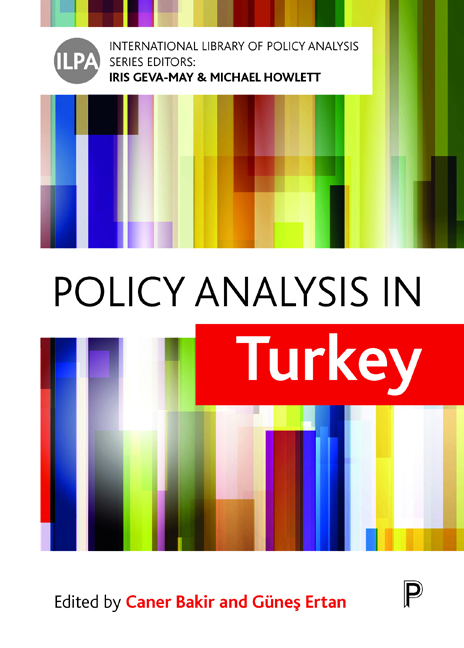Book contents
- Frontmatter
- Contents
- List of tables and figures
- Notes on contributors
- Editors’ introduction to the series
- one Pushing the pendulum from politics to policy: the state of policy analysis in Turkey
- Part One Historical roots, styles and methods of policy analysis in Turkey
- Part Two Policy analysis by governments
- Part Three Experts, international actors and public opinion
- Part Four Parties and civil society-based policy analysis
- Part Five Academic, bureaucratic and advocacy-based policy analysis
- Index
two - The past, present and future of policy analysis in Turkey
Published online by Cambridge University Press: 19 April 2022
- Frontmatter
- Contents
- List of tables and figures
- Notes on contributors
- Editors’ introduction to the series
- one Pushing the pendulum from politics to policy: the state of policy analysis in Turkey
- Part One Historical roots, styles and methods of policy analysis in Turkey
- Part Two Policy analysis by governments
- Part Three Experts, international actors and public opinion
- Part Four Parties and civil society-based policy analysis
- Part Five Academic, bureaucratic and advocacy-based policy analysis
- Index
Summary
Historical and global context of policy analysis in Turkey
In this chapter we trace the evolution of policy analysis in Turkey. The roots of policy analytical practices and thinking in today's Turkey can be traced back to the administrative traditions of the Ottoman Empire, when there were some practices that would fit the most general definition of policy analysis: giving advice to rulers or policy-makers for decision-making. There were efforts by Ottoman intellectuals to adopt the European scientific knowledge and practices to produce policy-relevant knowledge in the late 19th and early 20th centuries. The European and American influences continued in the Republican era, as the leaders made more systematic efforts to apply scientific knowledge and methods in policy-making. The knowledge transfer from Europe and the US was accelerated in the 1990s by Turkish academics who gained their advanced educational degrees abroad. They then began to teach courses on policy analysis at universities, organising public policy conferences in this and following decades.
Harold Lasswell, in his conceptualisation of the ‘policy sciences of democracy’ (Lasswell, 1951, 1971), most cogently articulated the body of knowledge the Turkish academics transferred. As Dunn (2012) points out, Lasswell's articulation followed centuries of developments in giving advice to the rulers of human societies. These rulers sought advice from ‘symbol specialists’ (that is, shamans, the clergy and the educated) before making decisions about when to plant crops, when to go to war against a rival tribe, and so on. These forms of advice were based on mysticism – they were not ‘scientific’ in the sense we would use the term today. Later in human history, the practice of advice giving was codified in major texts such as the Code of Hammurabi and Confucius and Kautilya's treatises, in Mesopotamia, China and India respectively. Centuries after these developments – with the Enlightenment thinking in the late 17th and early 18th centuries and the developments in scientific methods in the 19th and early 20th centuries – systematic and empirical information collection and analysis became possible, which constituted the foundations of Lasswell's articulation of the policy sciences.
The backdrop of the period of Enlightenment and the development of scientific methods led to a series of social and economic transformations in Europe and the US.
- Type
- Chapter
- Information
- Policy Analysis in Turkey , pp. 19 - 34Publisher: Bristol University PressPrint publication year: 2018
- 1
- Cited by



